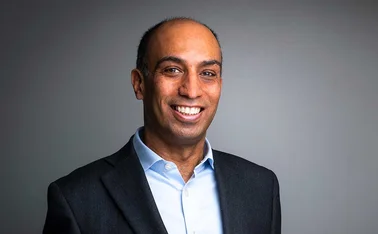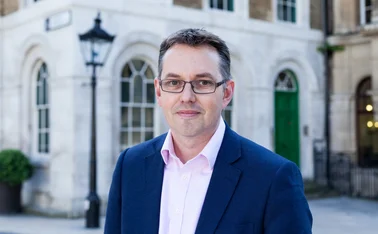
Broking success: Taking on the big boys
Portmore Insurance Broker’s director Graham Jacobs tells Caitlin Morrison how the company is able to compete with the nationals and why they like complex business
▶ How did the business get started?
Both mine and Paul’s [Chapman, co-director] background is in the City. We were both Lloyd’s brokers for too many years to mention. At varying times we both moved and ended up running the Southampton branch of Robert Fleming Insurance Brokers. At that time we got to the point where we felt that we wanted to do something on our own. We were getting tired of working for other people and felt that there was an opportunity. The Financial Services Authority had just come into being and there were a lot of brokers who were, perhaps not running scared, but adjusting to that environment and we felt the time was right. It was more about luck than judgment to be honest, we happened to be at the right point in our careers and off we went.
▶ How have you built up the business?
We’ve always predominantly dealt with commercial insurance, probably in the mid to larger end, so the arena that we have a lot of success in is really battling against the Aons, Marshes and JLTs of this world. Companies where it’s perhaps fair to say that their £50,000 accounts are considered small business, their £200,000-300,000 accounts are possibly considered enough but are not sitting in the top echelons and being dealt with by big teams. Over the years we’ve specialised in scooping that up. There was a hole in the market down here at the time, and again I’d love to say it was judgment, but it wasn’t.
 ▶ How did the recession affect the growth of the business?
▶ How did the recession affect the growth of the business?
A lot of the guys down here had been in the market for twenty years, and there’s nothing wrong with that at all, there are some really good solid players [in Southampton].
But we were young, we were fresh, we were hungry and actually, bizarrely, when the recession hit it was fantastic because everybody was looking to save money. We’d been making phone calls for 18 months, trying to get through the door, and suddenly people were saying: “Who are those guys? Let’s give them a shot”.
▶ Who are your competitors?
That’s a really difficult question to answer. We’re asked it by insurers all the time, and give the same response I gave earlier. There’s no rhyme or reason on this – we have had lots of success against the nationals. Particularly at what they would consider the smaller end, possibly because we’re able to give more of a personal service. We also come up against a number of local brokers, we come up against the Towergates of this world, Oval, Jelf, Aston Scott, you name it really. I wouldn’t say that we have any direct competitors and to be honest we don’t really think about it. We concentrate on ourselves. We try to focus on what we do well, and also on what we don’t do well so that we can try and do better. There’s always room for improvement.
▶ Which insurers do you work with?
A multitude. We have a strong connection to the London Market because of Paul’s and my background and use most of the players there. We also use all of the main insurers from Aviva to Zurich and we work with a few captives as well. To be honest we’ve got enough expertise here to deal with pretty much any general inquiry, whether that’s a mainstream insurance solution or a non-standard one.

▶ What are the business’ specialisms?
We write predominantly commercial business, and I would say our biggest specialism is really being able to get under the skin of our clients and understand their business. The more complicated and the more complex the risk the better it is for us. We’ve found over the years that a lot of brokers will shy away from the heavier casualty based risks. It’s been a very successful area for us. We can go into real complex businesses with lots of areas of expertise, for example we work with a company that manufactures radiation detectors that go onto the heads of nuclear submarines and into core reactors in power stations. Not everyone is going to want to write that. But we’ve found over the years that it’s about telling a story – these days there are so many presentations being made to insurers. You have to be able to paint a picture [of the risk] in every degree, and cover every facet of that business. If you explain it properly to the underwriter they’re going to be more comfortable. It’s about making sure that underwriters know that when we bring information to them they’re getting the truth, chapter and verse.
▶ Is it difficult to find staff to deal with these complicated risks?
It’s very rare that we actually go and interview for a position. The first time we took a big influx on was in 2009, Aon had closed one of their offices and so we took on four staff. Aon closed another office a couple of years ago and we took on another three staff. JLT closed their office at the end of last year and we took on a member of staff from there. We’ve concentrated on scooping up experience. One of the things that we have a mantra about is always employing people that are better than Paul and me – that’s what we do. We are the driving force behind the business, we are the face of it and we’ve got it to where it is today. Having said that, we could never have done it without the key client facing and back room staff. We have a mixture of experience and youth, from people in their late sixties to a couple of 19-year-olds. It’s about looking for someone with a bit of a spark.
 ▶ Do you have chartered status?
▶ Do you have chartered status?
No, we don’t. It’s something we have talked about. But the fact that neither myself nor Paul is ACII qualified precludes us from doing it, which is a bit of a shame really.
▶ Are you a member of a network?
We were a part of the Cobra network when we first started, then we came out of that because we weren’t allowed to attack other members for business and we would have created a bit of a problem. They were a means to an end for us to start up and they were very supportive to us. Then last year we went in to Compass network. They approached us and told us that networks had moved on from the days when you couldn’t compete with other members for business.
▶ Would you ever sell up?
Never say never. We’re not in the market to sell now. And of course the end game is always about realising your investment. However, we’ve always felt that if we were to sell, we’ve put a lot of faith in our staff, and we would never sell it to their detriment. At some point we’ll sell, but who knows when that will be. We get people coming to the door all the time, but nobody’s put an offer on the table that’s attractive enough.
Only users who have a paid subscription or are part of a corporate subscription are able to print or copy content.
To access these options, along with all other subscription benefits, please contact info@insuranceage.co.uk.
You are currently unable to print this content. Please contact info@insuranceage.co.uk to find out more.
You are currently unable to copy this content. Please contact info@insuranceage.co.uk to find out more.
Copyright Infopro Digital Limited. All rights reserved.
As outlined in our terms and conditions, https://www.infopro-digital.com/terms-and-conditions/subscriptions/ (point 2.4), printing is limited to a single copy.
If you would like to purchase additional rights please email info@insuranceage.co.uk
Copyright Infopro Digital Limited. All rights reserved.
You may share this content using our article tools. As outlined in our terms and conditions, https://www.infopro-digital.com/terms-and-conditions/subscriptions/ (clause 2.4), an Authorised User may only make one copy of the materials for their own personal use. You must also comply with the restrictions in clause 2.5.
If you would like to purchase additional rights please email info@insuranceage.co.uk







